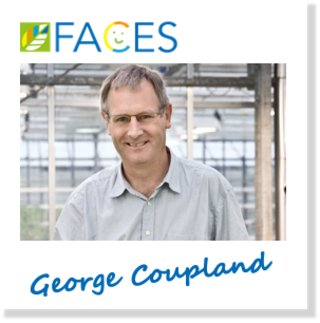

Six questions to George Coupland
Question 1
What fascinates you most about natural sciences?
I am most interested in explaining how whole organisms respond to their environment, and that’s one reason we focused for many years on explaining how plants use seasonal cues such as day length to control flowering. That led us into several interesting areas including circadian rhythms, systemic signaling and meristem identity.
Question 2
What is your favorite plant and why?
Well, I’m very fond of our experimental organisms Arabidopsis thaliana and Arabis alpina. They may not be beautiful to look at, but I understand them and their biology best. However, there are many wonderful plants. From my recent experience two come to mind. A marvelous sequoia tree that I saw in May on Mainau island in Lake Konstanz. It was planted in 1869, is massively tall but is just entering its adolescence. And a mature lime tree that I came across in the Eifel in June – it was flowering and was covered in bees, so that we heard the tree before we saw it. It’s hard to overestimate how much plants like that contribute to their environment.
Question 3
Which incident from your life as a researcher has remained in your memory the most?
I remember the difficulty of being a PhD student, and of desperately wanting to get experiments to work but struggling with the methods. And I remember as a post doc the excitement of obtaining experimental results that I knew would lead to good papers. More recently, I remember several instances of working intensely with students and post docs on papers to get the details right before they are submitted.
SPECIAL QUESTION
You were born in Scotland and have been living and working in Germany for a long time. Is there any change expected for you professionally and privately post Brexit
Brexit is a great disappointment to all British scientists I know. It has affected my private life, in that it induced me to become a German citizen as well as a British one. I expect that dual citizenship will protect me from any legal issues concerning travel or residency restrictions that might arise with Brexit. We won’t know exactly the legal framework of Brexit until the end of the year. But it will harm European science if the involvement of British labs in collaborative science programmes or the freedom of British post docs and students to work in the EU is made more difficult.
Question 4
What advice would you give to young scientists?
Work in good places with good people on an interesting biological question. If you are lucky enough to start your own research programme, find an interesting, ambitious biological question that really interests you and has the scope to sustain a career for decades.
Question 5
If you had the choice, which research question would you like to be able to answer?
I’m interested in the problems we do work on of how plants flexibly respond to their environment to control their growth and development. But, memory is a fascinating problem. How the human brain stores information and can release it within seconds when prompted to do so is an amazing biological problem, and seems to be becoming tractable using model organisms.
Question 6
What's your favorite thing to do after work?
I like hiking and birdwatching, watching films, reading, eating good food and traveling. I’m lucky to live in Cologne where there are many opportunities to do all of these things easily.

Profile
Name:
George Coupland
Position:
Director Department of Plant Developmental Biology, Max Planck Institute for Plant Breeding Research, Cologne
In CEPLAS since:
2012
Place of birth:
Dumfries, UK